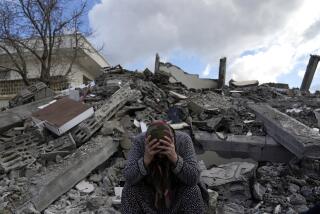Cyprus Vote Stirs Immigrant Fears
- Share via
ASHA, Cyprus — When Cuma Karakas arrived in Cyprus 30 years ago on a boat full of settlers, he says, he never imagined, as he now fears, that he might be forced to return one day to his native province in southern Turkey.
The Turkish government “told us we had a new life, new land, new homes here in Cyprus, that we would stay in what was to become our new motherland for good,” the 73-year-old farmer said.
“They were lying to us all along; we have been betrayed.”
Karakas is among about 45,000 Turks who arrived on Cyprus after Turkey’s invasion of the northern third of the island in 1974. Turkey pushed for the emigration to shore up Turkish presence on the island, dominated by about 700,000 ethnic Greeks. There are also about 100,000 Turkish Cypriots whose ancestral roots predate the invasion.
Karakas says he will vote against a United Nations plan that aims to end the island’s bitter division when Turkish and Greek Cypriots vote in separate referendums Saturday.
The proposal, devised by U.N. Secretary-General Kofi Annan, calls for a loose federation of Greek and Turkish states. Karakas believes that it will force him from the island, though the plan guarantees that the vast majority of Turkish Cypriots, including settlers, would stay.
On Wednesday, Russia vetoed a U.N. Security Council resolution designed to buttress Annan’s reunification plan, arguing that the body should not attempt to influence the referendums. Russia agreed to reconsider the resolution after the plebiscites.
About half of the Turkish settlers oppose the U.N. plan, but among all ethnic Turks on Cyprus, about 60% favor it, according to polls.
Greek Cypriots are guaranteed admission to the European Union on May 1, when their southern portion of the island will obtain full membership along with nine other nations. If both referendums pass, the entire island would join the EU.
Turkey has thrown its weight behind the U.N. plan in the hope that ending the decades-long Cyprus dispute will ease its own bid to join the EU.
Polls on the Greek side suggest, however, that a majority of Greek Cypriots oppose the U.N. blueprint, partly because the settler Turks would become full citizens of the new Cypriot entity, and thereby reap the fruits of EU citizenship.
But some Turkish settlers bitterly reject reunification because they fear they may lose their homes.
According to Mehmet Ali Talat, the Turkish Cypriot prime minister who has been leading peace talks on behalf of his constituency, they have been “deliberately disinformed” by hawks in Turkey’s military and bureaucratic establishment and their Turkish Cypriot proteges, who stand to lose influence if the island is reunited. He says that chief among them is Rauf R. Denktash, the veteran Turkish Cypriot president who rejected a U.N. plan when it was floated last year, arguing that it would reignite violence between Turks and Greeks.
“The suggestion that these people [Turkish settlers] will be forced to leave Cyprus is utter nonsense,” Talat said in an interview.
“Had that been the case, we would have never backed the [U.N.] plan.”
Last week, Talat gave U.N. officials the names of about 40,000 Turkish settlers who would be assured of staying under the U.N. plan. In order to qualify for the list, they had to meet a range of requirements, including residency. Children of qualified settlers and about 8,000 people married to Turkish Cypriots would gain citizenship rights as well.
“Pretty much all of the Turkish settlers match those terms,” said Mete Hatay, a local academic specializing in migration issues. Hatay says the distrust felt by settlers stems in part from tensions that have long simmered between Turkish Cypriots and their ethnic cousins who later moved to the island.
“The first wave of settlers were mostly uneducated laborers. Sadly, they were treated as intruders by some Turkish Cypriots who viewed themselves as being more European and therefore superior,” he said.
Many settlers said they felt unwanted by the Turkish Cypriots. “They will be happy to see us leave,” said Ismail Tutucu, a farmer who migrated from Turkey in 1976.
Such suspicions have been sharpened by the Turkish Cypriot administration’s refusal to publish before the referendum the list of those who would be allowed to stay under the plan.
“We have been urging them to release the names, but they say they will not do so until April 25, without explaining why,” said Nuri Cevikel, the president of the Turkish Settlers Assn.
Fears of forced displacement are especially deep in this village about 15 miles from the divided Cypriot capital, Nicosia. Asha, known as Pasakoy in Turkish, was inhabited by Greek Cypriots before the division, and it would be returned to them under the U.N. plan, which calls for the Turkish Cypriots to give back nearly 20% of the land that came under Turkish occupation in 1974.
About 2,000 Asha residents, nearly half of them Turkish immigrants, would be resettled elsewhere on the island. The relocation would be financed in part by about $1 billion pledged during an international donors conference last week in Brussels. The Bush administration, which has been lobbying for approval of the U.N. plan, has said it would contribute $400 million.
Karakas, the settler from Kahramanmaras province in Turkey, remains worried.
“These are just a string of lies,” he said. “It has become clear now that Turkey [spent] all these years as caretakers of Greek homes. Now they will return those homes to the Greeks and leave us Turks out in the cold. If I’d only known, I would have never set foot on this cursed island.”
More to Read
Sign up for Essential California
The most important California stories and recommendations in your inbox every morning.
You may occasionally receive promotional content from the Los Angeles Times.













